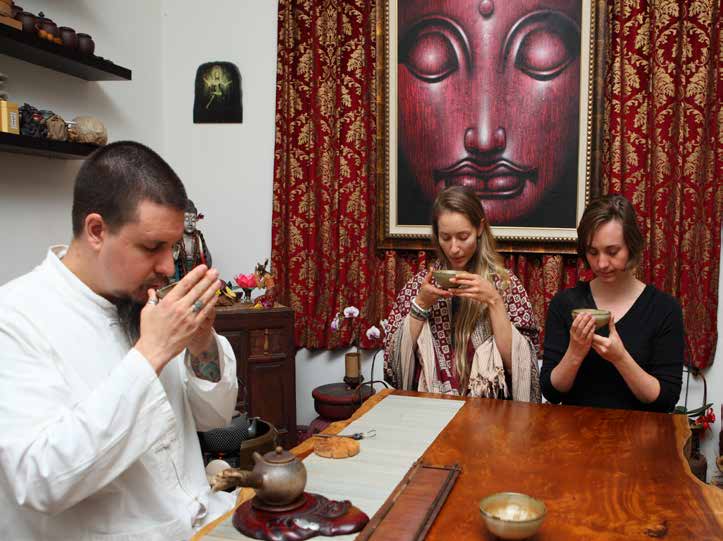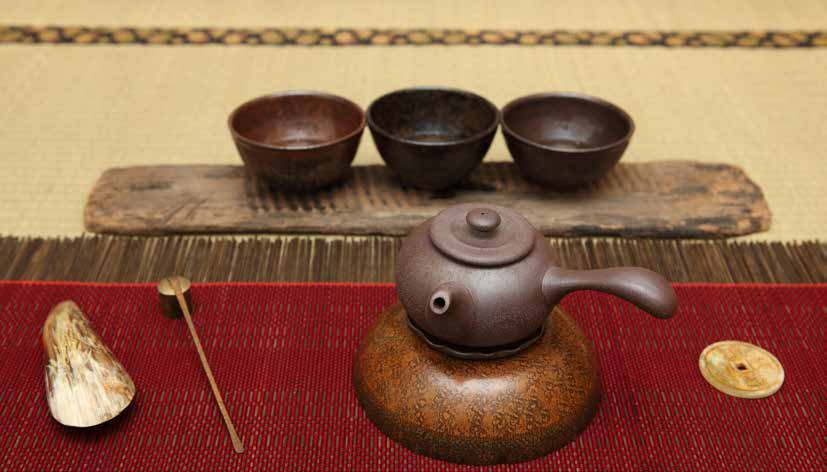
 |
|
Tea is a Dao because it leads up to and beyond mastery of the self. In all arts, there comes a point at which the artist reaches the limitations of the medium, and the boundaries of the personal. Progress then leads into the transpersonal: the point at which we meet the divine ground. The transpersonal is our consciousness freed of a sense of self - liberated of the jail yard of privation we all face. In order to go any further, the master must move beyond the medium: Having mastered the art of tea, one realizes that any and every step must also include every aspect of life. What we eat, how we exercise, meditate and even how we treat people all affect our tea. The fact is that without mastery of the self in every way, there cannot be any mastery in tea.
True mastery is finding that point in ourselves that meets with the Dao - the universe we are immersed in - and then acting from out of its intelligence and power, rather than our own limited perspective. And all that is born out of that deep stillness, beyond rationality and ego, will inspire others to seek out that place in themselves. In other words, when we brew tea from beyond the self, resting in our hearts, others respond and join us in that space.

If metaphysical truth and spiritual upliftment are qualities of great art, then the artist must attune her sensitivity and develop spiritually as much as she learns to use the guitar, brush or tea pot. To reach the goal where spirit flows through you into your tea, you must be a clean vessel. The master remains open to the ocean of spirit we are immersed in, channeling some of it down through this finite form and into the art, which is then shared and integrated back into the divine ground through the consciousness of others.
Great artists, musicians, dancers and athletes have all stirred us to awe, performing feats beyond the ordinary, beyond even themselves and anything they have achieved thus far. And they cannot answer how they did it - only point skyward - for it came from outside their sense of self. It came from the place their soul melts into the divine ground.

To inspire means to breathe in, and in ancient cultures - Chinese and Western - the breath and the spirit have always been synonymous. To in-spire is to rest in the spirit; and inspiration is access to the spirit, both creatively and receptively. The master transcends the limited self and channels the universal.
The poet is a light and winged and holy thing and
there is no invention in him until he's been inspired and is out of his
senses, and the mind is no longer in him.
The great intelligence of this world is always present, always now. To be in harmony with the flow of Reality, the master must also be rooted in the Now. The great athlete has no time for mind: no time for past, future or fantasy. If an athlete has performed poorly, it is because he or she had something on their mind. Some bookies made a living finding out personal facts about famous professional athletes and using that information to their advantage. In the split second a ball is traveling hundreds of miles an hour, the batter has no time to think of the girlfriend he split up with recently. If he does, he strikes out. In fact, he cannot even think of the bat, the ball or his body; for if he reflects for one millisecond on where his arm should be, he misses his chance. He must act without thought, beyond reason and past the sense of self: the transpersonal. In that way, the great dancer and the music are one. She flows with the rhythm magically, transported before the note even sounds. The melody and her movements are not separate; they are the same symphony.

Mastery in tea flows in a similar harmony. When one is in harmony with the present moment, the connection between the brewer, kettle, pot, tea, bowls and drinkers vanishes. The master adapts subtly, allowing the emptiness in all the vessels to accept the flow of water and liquor through it. Such tea is transformative, indeed.
There are a lot of brewing instructions that have a general validity to them, but which also may hinder our progress towards the transpersonal - towards harmony with our tea and the moment, which leads to harmony with the Dao in all aspects of our life.
The more scientific approach to tea brewing, for example, is to focus on time, temperature and amount of tea. Indeed, these are three common errors for beginners and getting a feel for the amount of tea, the temperature of the water and the steeping time can lead to a more delicious cup of tea. But there are way too many factors for any of these criteria to last longer than even a few weeks of progress in tea. Amount is crucial, but different teas require different amounts; some are long and striped and twice the volume weighs half as much; some are incredibly sensitive and others are forgiving. Also, the size of the brewing vessel, as well as the material it is made of, will determine the amount of tea. Similarly, water temperature and steeping time also quickly evaporate into thousands of factors and influences. Most tea drinkers who travel such a road quickly realize how limiting focusing on these three criteria alone can be. Controlling the time, temperature and amount isn't really controlling anything at all. But it does bring us to an important aspect of mastery: it isn't about control!
As we mentioned above, true mastery isn't controlling all the factors (as if that were possible anyway). It is about achieving harmony with the moment, and acting with the current of the Dao behind you. Approaching tea with conceptual ideas about time, temperature and amount assumes that control will result in better tea. One then uses a scale, thermometer and timer to brew tea, relying on machines to help control these aspects of the tea. All of this further disconnects the brewer from the tea and the moment, leading away from mastery of self and harmony with the Dao.
Similarly, a lot of teas will come with brewing instructions that are specific to a genre of tea. But within the genre of Green Tea, for example, there are hundreds of varieties from China, Japan, Taiwan and Korea. Each one is different, and there are hundreds of ways of brewing such teas. Furthermore, such instructions rarely come from personal, experiential wisdom. The guidelines are hardly ever based on the trial-anderror wisdom of the vendor, instead offering the same information that can be garnished online or from popular literature on tea. Continuing with Green Tea, an illustration of this would be the way most all Green Tea packages claim that Green Tea must be brewed using lower temperatures of water, and that to use water that is too hot will cook the tea. This can be true for a lot of Green Teas, but not all. Really fine green teas can often take hotter water (not as hot as Puerh or aged Oolong) and the result is not something inferior, but something different. Such packages also claim that Green Tea cannot be aged and expires at a certain time, but we have a twelve-year-old Long Jing here at the center that would beg to differ. Some allusions to freshness are true, as aged green tea and fresh green tea are very different - and preferences are preferences - but so-called stale to is misleading, since all fine, organic tea can be aged.
Brewing tea based on genre is a bit like categorizing groups of people based on proclivities or other prejudice. Reducing living things to conceptual categories and treating them thus is a form of violence. The intellectual and egoic distance from Nature is the sickness behind the gross pollution of the environment by greedy companies and persons who do so smiling all the way to the bank, ignorant of the fact that in harming their Earth they only harm themselves. Tea is a living being and each and every meeting is unique. Unlike us, tea leaves are not disconnected from their source. All the flavors, aromas, nutrients and spiritual juju in a handful of leaves got into those leaves from the roots, trunk and branches of the tree and remain there now. The tea liquor and tree are one.
Rather than brewing a genre, why not meet each and every tea as a unique friend and brew her accordingly? Even the teas that you drink again and again are new every time, if you but pay attention. And like all tea wisdom, this can teach us how to live as well: for how often do we dismiss a flower or some grass, not stopping to see how beautiful it is, saying instead "It's just grass", as if we had seen this grass before. Categorizing has been useful to us as a species, and has led to many new and important scientific discoveries. But living in a conceptual, rational world comes with its own misery, and our next stage in the evolution of consciousness is to transcend the personal and rational, which doesn't mean that we'll be incapable of rational thought. To the contrary, when you rest outside the mind, it becomes a better tool than when you are consumed by it and lack mastery of the self. Also, we can then choose when to differentiate and dismiss, and when to recognize the beauty and uniqueness of this grass, in this moment.
Meet everyone for the first time, every time. This offers people the chance to transform and the room to grow. The same can be said for tea: every tea is unique and should be brewed the way it wants to. You can learn from a tea, as you would from a person you are getting to know, developing more skillful ways of relating to her; but you still must allow her room to change and grow, and be ready to adapt every single tea session to suit that particular session. Otherwise, you will never know how far and into what reaches a particular tea can stretch. You will assume you know all there is to know about her if you don't listen and flow with the session, adapting and coaxing the tea along the currents of Dao.

My master always says that the highest gong fu, the highest level of mastery, is when you can discriminate each and every leaf of tea, for no two leaves are the same under Heaven. That level may be beyond us all, but it isn't about reaching an objective anyway. Though we often talk about progress in tea, the wise don't strive to arrive. Happiness isn't the name of a hotel at your destination, it is the journey. As soon as you meet your goal, another horizon presents itself. The true student of the Leaf learns from the way tea is present and completely immersed in the moment. This is our chance to brew perfectly: this very bowl, this very tea. In this moment, we can complete our harmony, let go of the self and drop all our goals. In the transpersonal connection with the divine ground there are no goals to achieve, no heights to scale: there is only this simple bowl of tea, which spans the breadth of the universe...
